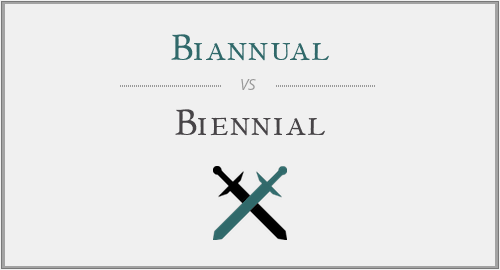Biannual and biennial are treated as if they are interchangeable or they mean the same. Some people who know the difference but still get confuse about which is which.
Consider the two sentences below;
We have biennial flowers in our garden.
They held biannual conferences; every other year.
Can you make the meaning of both the words from these examples?
Most often marketing departments of companies mistake these words and marketing departments should be extra cautious, as misusing these two words could cost them quite a bit of money.
Origin:
Biannual is a combination of two English words; bi and annual. Biennial originated from early 17th century: from Latin biennis (from bi- ‘twice’ + annus ‘year’) + -al.
Biannual as adjective:
Biannual is used as an adjective in English language where it has only one meaning which is occurring twice a year.
The biannual meeting of the planning committee.

Biennial as adjective:
Biennial is used as an adjective in English language where it means taking place every other year.
The first of a series of biennial exhibitions.
Biennial is also used to describe a plant taking two years to grow from seed to fruition and die.
Onion is a biennial plant.
Biennial as noun:
Biennial is also used as a noun where it implies a biennial plant or an event celebrated or taking place every two years.
The top antiques fairs are the Milan and Florence biennials.
Biannual or biennial:
Biennial means once every two years. Thus, this adjective can be used with things that happen every other year. For example, the biennial chess tournament is a tournament that happens once every two years. If the last competition was in 2015, then the next competition would be in 2017. Biannual means twice a year. Thus, it can be used to describe something that happens two times a year. For example, a journal that is published only twice a year is called a biannual journal. A meeting that only happens twice a year is called a biannual meeting. Solstice is also a biannual event.




Have a discussion about this article with the community:
Report Comment
We're doing our best to make sure our content is useful, accurate and safe.
If by any chance you spot an inappropriate comment while navigating through our website please use this form to let us know, and we'll take care of it shortly.
Attachment
You need to be logged in to favorite.
Log In